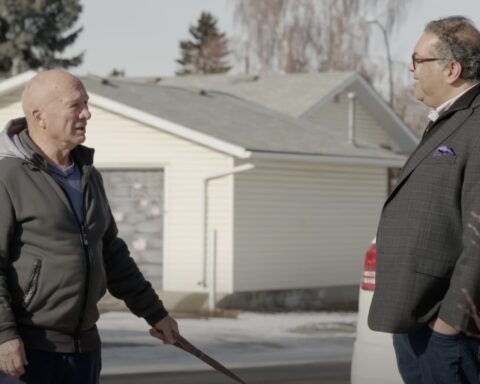Elisabeta Bilegan rubs her baby bump, animatedly sharing details about her organic diet: smoothies and her daily serving of fruits.
The pregnant 29-year-old is halfway through her second trimester and insists there’s one thing she doesn’t need in her body – the flu vaccine.
“I just think if you’re good with your immune system, you’re taking care of yourself, there’s no need,” says Ms. Bilegan.
Romanian-born Bilegan has been in Calgary for just over four years, after having lived in Italy prior to immigrating to Canada. She says she’s never had a flu vaccination before, and the thought of introducing foreign chemicals into her system makes her cringe. Even though her family doctor has suggested she get the shot, she refuses.
“I think in North America, they’re focusing more on flu shots. Growing up in Romania, you never heard about a flu shot.”
Looming pandemic
In a province of more than 3.6 million, just over one million Albertans were immunized with the flu vaccine by early January. Alberta Health Services claims it’s already been the most successful vaccination season ever. A victory, given the eight reported deaths province-wide and upwards of 1,500 lab-confirmed cases of H1N1.
Not to mention mounting fears of a looming H1N1 flu pandemic.
People flocked to mass clinics and pharmacies, eager to get the shot. In some cases, even waiting for hours, until supplies ran out. Alberta’s Health Minister Fred Horne has contacted the Public Health Agency of Canada, requesting more vaccines for the province. However, in the event another shipment arrives, Alberta will not be re-opening any of its flu clinics for this season.
Still, many Calgarians – much like Ms. Bilegan – hesitated about getting the vaccine.
“When I read the newspapers in the morning, I was kind of thinking, ‘Should I get the vaccine? I shouldn’t,’ and so on,” says Ms. Bilegan.
Some worry they’ll catch the flu from the shot. Health specialists say that’s impossible – if the vaccine contains the flu virus, it’s already been ‘inactivated, and therefore not infectious.’ Additional concerns stem from the trace amounts of formaldehyde in the vaccine. Infectious disease specialists have publicly refuted rumors this can harm humans. [Fewer than four in ten Canadians have been immunized against influenza, and the principal reason for not getting the flu shot is mistrust of vaccines, according to a new national poll conducted by Forum Research.]
The fear of pandemics
“It’s more talked about here [than in Europe],” says Dr. Neil Rau, an Ontario-based medical microbiologist specializing in infectious diseases.
“I think fear of pandemics is greater [in Canada]. It’s also captured the media a bit more. For better or for worse.”
Dr. Rau adds that “there’s an ugly face to the disease,” particularly since at-risk groups are not just limited to children and the elderly, but younger, healthier people as well.
It’s caused Ann Anwer plenty of concern.
The Iraqi-born mother of three has been in Calgary for under a year and intends to get the vaccine – along with her family – as soon as she recovers from the seasonal flu.
Ms. Anwer says she has faith the vaccine will protect her from illness and wonders why people need to give it a second thought. She says convincing people in her own community can be challenging.
“I think in every community, this will happen, especially in our countries in the Middle East. They have suspicions.”
Ms. Anwer adds the vaccines aren’t as readily accessible as they are in Canada. Moreover, she says people in her community can be “stubborn”.
“They don’t have the knowledge about the vaccine, about how to get immune from it,” she says. “Just the educated families are open-minded. Those will take the vaccine. Otherwise, they won’t.”
Meanwhile, Dr. Rau doubts that reluctance is a sentiment shared within specific ethnic communities – but one that cuts across the board.
“I think there’s an equal level of interest and apathy and skepticism — whether it’s immigrant communities or not,” says Dr. Rau. “I don’t think it follows a unique pattern from a new Canadian perspective.”
Today in Alberta, a small amount of doses are being held for children, people at high risk, and pregnant women, not unlike Elisabeta Bilegan, who says the H1N1 death toll makes her nervous. She isn’t ruling out the possibility of some day getting the shot – just not anytime soon.
“If there’s something I need to do for my health, I will,” she says. “I just think it can be like a normal flu and nothing can happen.”




